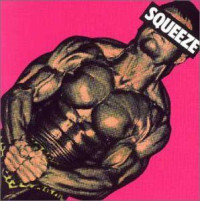The new wave genre found its footing in the mid to late 1970s, making an indelible impression on the trajectory of punk music in both the United Kingdom and the United States well into the 1980s. Mainstream bands like New Order, Depeche Mode, Devo, Talking Heads, and The B-52’s were most notably associated with the movement, which at the time seemed to encompass punk acts that incorporated more pop elements, refined production, and an electronic or mod edge. Though easily dismissed as a catchall term by some, “new wave” presented an opportunity for musical experimentation and for broader influences to come into play.
London-based group Squeeze would become a vital contributor to new wave culture in the UK, despite having somewhat scrambled beginnings in 1974. Their first EP Packet of Three and self-titled LP were both produced John Cale of The Velvet Underground fame, who openly failed to share the band’s musical and lyrical vision. Cale asked for many improvisations and song rewrites on the spot, and Squeeze’s release in 1978 ended up a very different work than what the group had originally planned. To further complicate matters, confusion and potential legal disputes arose with similarly named artists in the United States and Australia, leading the band to temporarily rebrand themselves and their album with the geographically specific moniker UK Squeeze.
Chris Difford and Glenn Tilbrook, Squeeze’s founders and chief songwriters, forged a musical partnership that felt auspicious even in their early stages. Their alchemy echoed that of the Lennon and McCartney powerhouse, but in a new wave outfit. Keyboardist Jools Holland, percussionist Gilson Lavis, and bassist Harry Kakoulli filled out the roster and possessed a confident mastery of their respective instruments; they were airtight and unafraid to experiment.
Squeeze contained a diverse mix of songs, some catchier and better received than others, along with several plain oddities that demanded recognition. As far from the norm as a given song might stray, they each displayed serious musicianship, theoretical knowledge, and a charming sense of awareness. “Wild Sewerage Tickles Brazil”, aside from having that title, was purely instrumental and eccentric: a repetitively booming bassline, sporadic but intense drumming, staggered guitar twangs and riffing, muffled layers of crying and cheering. The song sounded more like the work of Japan’s Les Rallizes Dénudés than any of Squeeze’s more household contemporaries. “The Call” featured five minutes of a recurring drum roll sequence and lengthy guitar extemporizations, overlaid with a sing-song duet by Difford and Tilbrook that undercut their voices rather than highlighted them. The intro track “Sex Master” kicked off with some driving, hard-to-hate energetic piano rock, but lines like “Frustrated client seeks a man of the world / Must be frank and know his hand relief well” left the song feeling a bit silly and stale.
The two tracks off Squeeze released as singles, “Bang Bang” and “Take Me I’m Yours”, were actually produced by the band without John Cale. “Bang Bang” launched in a dreamlike, languid state with soft percussion and swirling guitar before picking up the pace and introducing a series of effective gang vocals. Tilbrook’s airy but distinctive voice was a great match for the surf rhythm and tones that accounted for the rest of the tune. “Take Me I’m Yours”, however, was Squeeze’s first major commercial success, and came without compromising its musical complexity. The epic synth-pop track was a testament to the group’s musical expertise and ambition; a symphonic arrangement married perfectly with a lyrical heroic poem.
Squeeze received little critical acclaim, nor was it a complete showcase of what would make the group’s music so triumphantly unique. As a debut full-length, however, the record was evidence that the members of Squeeze were promising technical talents with an exceptionally modern sound. Strolling onto the scene in 1978 alongside major players like Elvis Costello, The Boomtown Rats, and The Police was a challenge in and of itself, an environment overflowing with creativity and newness, yet Squeeze found a way to stand apart. In spite of criticism and production missteps, Squeeze captured a personality, an aesthetic, and some strong musical moments that the group went on to develop far more fittingly and successfully in their ensuing iterations.
